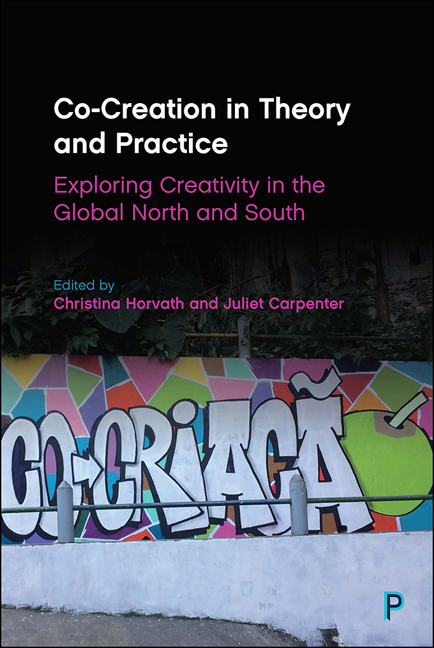3 - Fostering Artistic Citizenship: How Co-Creation Can Awaken Civil Imagination
Published online by Cambridge University Press: 18 March 2021
Summary
Introduction
One of the many spheres from which marginalised and deprived communities have been constantly excluded is that of culture and the arts. Indeed, as Moore (1998) and many others have documented, people living under precarious conditions have very limited access or no access at all to museums, galleries, cinemas and other cultural and artistic venues. The methodology of Co-Creation discussed throughout this book engages researchers, community workers, artists, policy makers and, most importantly, members of a particular neighbourhood or urban community as participants in creative projects and other inclusive artistic practices.
The central idea behind Co-Creation is that, through collaboration where all participants contribute as equals, knowledge is both shared and co-produced and new synergies are fostered. By promoting equal participation through projects that make different art forms and creative practices available to marginalised communities, Co-Creation has the potential to counter segregation and build relations based on solidarity, respect and collaboration. The role of art and creativity within Co-Creation projects is crucial insofar as these practices function as bridges that connect the different participants: researchers, artists, activists, policy makers and residents or community members. Although it is important not to romanticise the extent to which arts-based projects can bring about significant social change, as Rosie Meade and Mae Shaw (2007) have argued ‘clearly the arts cannot transcend socioeconomic contexts by the force and will of their craft alone’, socially engaged arts do have the potential to ‘awaken people to both the negative and positive spaces which it opens up’ (Meade and Shaw, 2007: 416).
The aim of this chapter is to explore how and to what extent the collaborative art and creative projects that are essential to Co-Creation can help to make visible the conditions of marginalisation within and beyond the communities in which they take place. The discussion here will be theoretical, as there are other chapters in this book that analyse specific Co-Creation projects and their outcomes. Rather than focusing on any particular case study, this chapter will claim that these projects contribute to awaken what Ariella Azoulay (2012) calls ‘civil imagination’, and hence also take part in the construction of ‘artistic citizenship’.
- Type
- Chapter
- Information
- Co-Creation in Theory and PracticeExploring Creativity in the Global North and South, pp. 41 - 54Publisher: Bristol University PressPrint publication year: 2020

